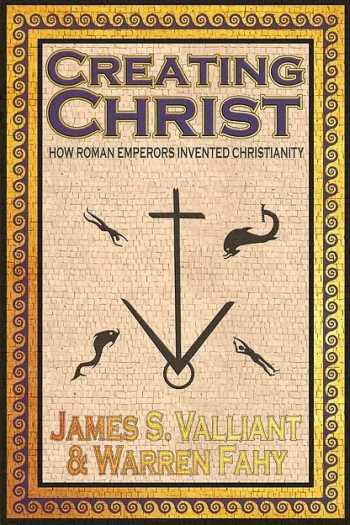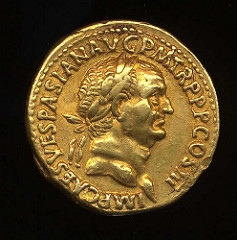This is a republishing of the Metaphysics of Physics podcast interview with James Valliant, one of the authors of the book Creating Christ. We talk about this important book and what it reveals about the Roman origins of Christianity.
For those unaware, the Metaphysics of Physics was the previous incarnation of this site and for a time in included a podcast.
You can read the transcript or use the audio player below to listen to the interview. Or do both if you prefer!
Click here to download the episode.
Introduction
Today we interview James Valliant, author of the important book “Creating Christ: How Roman Emperors Invented Christianity“. This interview is basically a question-led interview and provides long answers to the relatively few questions which were required.
Please note that some of our interviews reference “Metaphysics of Physics”. This was the previous incarnation of the Rational Metaphysician.
About Creating Christ
The thesis of Creating Christ is that Christianity is the result of Roman propaganda in the first and second centuries. Designed to pacify Messianic Jews and to integrate them into Roman society.
This might not seem to be an important subject or a probable claim, but it really is. If Christianity and its proper place in the history of the West is to be understood, it is important that the true nature of Christianity is understood.
But, is this claim true? Yes, as you will discover when you listen to the podcast and or read the transcript.

Episode Transcript
This episode is about one hour and fifty-six minutes long. As a result, we have not implemented the episode transcript in the usual form. We have provided a transcript in an edited and more formal form. It is much like a formal written answer to the question, however, the questions do very closely match the content of the audio.
However, please note that there may be minor mistakes in the transcript. I have done my best to clean up any spelling and grammatical errors, however, due to time constraints, it has not been possible to edit out all possibility of such.
Click here to download the PDF transcript.
Brief Excerpt
Ashna: James, please introduce yourself and explain the thesis of the book:
James: My name is James Valliant. I am the co-author of the new book “Creating Christ: How Roman Emperors invented Christianity”.
Basically, it takes on what would certainly strike most people today, certainly most Christians today, as a rather outrageous thesis. That in fact, the New Testament is Roman propaganda. That when it was originally written, it was written with a certain political agenda. As well as a certain theological agenda.
Most Christians would think that is crazy. They regard Christianity as the very opposite of Roman philosophy. They believe that the Romans persecuted Christianity. Hollywood has certainly convinced them that in the last century. But, there’s a forgotten history here.
Two thousand years ago, there was cataclysmic war between the Roman Empire and Jewish Messianic rebels. And the rebellion was largely motivated by religious factors. It was that war, that cataclysmic war, that destroyed the temple, for example. Reduced it to the Wailing Wall that it is today.
It is difficult for me to imagine that Christianity emerging at that very same moment in history is just an accident. And when we started our research, we found nothing to contradict our theory. And then we found some remarkable physical evidence which basically demonstrated it.

In short, the thesis is that what we have in the New Testament is Roman propaganda written 2000 years ago to quell the Jewish revolt. That is very much the 30,000-foot level of analysis. Or I should say 10,000-meter level, from New Zealand. [footnote]Dwayne and Ashna were living in New Zealand when this was recorded[/footnote]
So, from way up in the sky, looking down on it, the way to really look at it is that the moral idealism that we read in the New Testament is really a form of political propaganda.
It is also regarded as moral idealism, both by Christians and even by secular people who have adopted it.
And having forgotten the original context of the New Testament’s creation, it’s very easy to detach ourselves from that. And to think of the doctrine of Jesus Christ as sort of an unworldly, non-earthly form of moral idealism.
But when you just change the angle slightly and you look at the entire New Testament from this new angle, suddenly everything is explained. We were simply blown away, I think when we started pulling that string because nothing contradicted it. And all the evidence seemed to confirm it.
Ashna: Does it matter how Christianity got started? Why does that matter to us now?
James: Well, that’s a fair question. This is 2000-year-old history and Christianity has certainly changed considerably. At least it’s operative doctrines have. The New Testament itself obviously has not changed, but the way Christians understand and live those doctrines has dramatically changed over the last 2000 years.
So that’s a very good question. Why should we even care? Well, there are two very good answers to that. History matters. And particularly the history of ideas.
Human beings are really motivated by their ideas and their history can be understood in terms of the power of ideas. Although these ideas are 2000 years old, they literally reach across the millennia and control our psychologies, our view of what’s morally right and wrong.
Even people who are secular, people who tend to be on political left and who don’t have much of a religion, have basically adopted Christian social ethics is their own. Socialists and Communists have basically applied the ethics and the social doctrine of the New Testament in a very consistentway. While simply leaving out all the mystical and miraculous stuff.
So, the values and the ideas expressed in the New Testament are still a living vital, powerful force. On the American left, they have adopted elements of pacifism, social altruism and concern for the poor above other considerations.
The discovery, whether you’re religious or not, that the moral idealism of Christianity is in fact simply a form of political propaganda, is crucially important.

